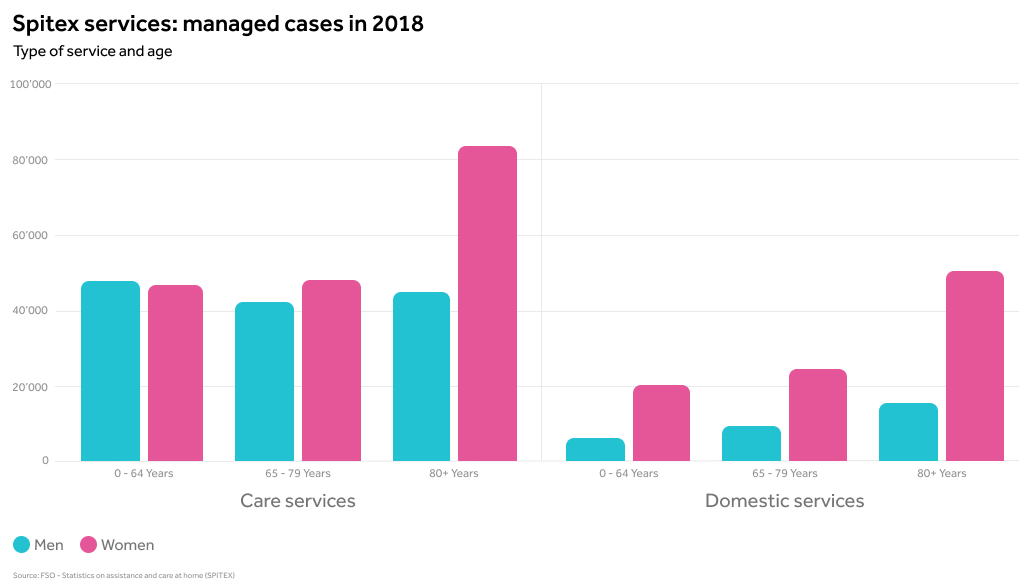Nada Lanz, 43, was born in Albania, grew up in Rome and moved to Switzerland 15 years ago. After going…

Home care: These are the differences between care and nursing
Care and nursing for people at home are services that are financed differently: The basic insurance of the health insurance company only pays for medically prescribed, nursing services in the case of non-hospital care and support at home (“Spitex”). quitt. shows which home care services you usually have to pay for yourself.
That’s what it’s about
- The term “Spitex” stands in the German speaking part of Switzerland for “nursing and caring at home”.
- An important difference between care and nursing at home concerns their cost coverage: Health insurance companies must cover medically ordered nursing services at home in the basic insurance. The catalogue of benefits is listed in the Health Care Benefits Ordinance (Ordinance on Health Care Services, KLV).
- Care is understood to be all non-nursing services that fulfil a social, supportive or administrative task. These costs are not covered by the basic health insurance.
- Certain care tasks can be covered by supplementary insurance. If you do not want any surprises, contact your health insurance company in advance.
- Housekeeping services are also to be paid for by the client/patient themselves, except for those who have a corresponding supplementary insurance. In this case, part of the housekeeping services is paid. Some subsidies are paid by the municipalities.
Private and non-profit Spitex organisations
A representative survey by the care service provider “Home Instead Seniorenbetreuung” shows: More than 90 percent of the seniors and their relatives surveyed want to be able to continue living at home even if they need assistance and care. In Switzerland, private and non-profit Spitex organisations provide services that enable people of all ages who need help, care, support, assistance and advice to live and work at home. The abbreviation Spitex stands for “spitalexterne Hilfe und Pflege” and is the general term in Switzerland for outpatient care and support at home.
Out of 100 people aged 80 and over, 29 receive care at home
According to the Federal Statistical Office, 395,000 people in Switzerland were receiving support at home from Spitex organisations as of the end of 2019. They provide nursing and health care at home, support in the household, social counselling and companionship. Around 5 per cent of the total Swiss population make use of Spitex services. Out of 100 people aged 80 and over, only 15 were staying in a retirement and nursing home at the end of 2019. 29 people received care and support at home.
Doctor must determine need and order home care provision
The services of Spitex organisations can be used by all citizens of Switzerland who need care and support at home. You can request Spitex, for example, in the case of physical and mental illnesses, old-age complaints, after accidents, after a birth or in the case of pregnancy complications. The prerequisite: a doctor confirms the need and orders home care. Important to know: The compulsory health care insurance does not cover any home care services or nursing services that are not specified in the “Verordnung des EDI über Leistungen in der obligatorischen Krankenpflegeversicherung (KLV)” (text in German only).
Health insurance funds do not cover all care services
Health insurance funds must cover general basic care for people who cannot perform these activities themselves. This includes, for example, services such as “binding legs, putting on compression stockings or help with mouth and body care, dressing and undressing, eating and drinking” and so on. These services must be performed by qualified nursing staff. This means that their professional qualification must be recognised in Switzerland. None of these activities may be performed by a caregiver if their employer does not have a Spitex permit. Good to know in terms of costs: The user of Spitex services is subject to a 10 per cent deductible plus a patient contribution that varies from canton to canton.

Different hourly rates
The compulsory health care insurance reimburses different hourly rates for basic care, examination and treatment as well as clarification, counselling and coordination. According to Spitex Switzerland, a minimum of 10 minutes is charged per intervention. Subsequently, billing is done in units of 5 minutes. Depending on the canton/municipality, the person in need of care pays a maximum patient contribution of CHF 15.35 per day or CHF 5613.70 per year.
Not all services are subsidised
These costs are in addition to the normal 10 per cent deductible and the franchise. According to the Federal Statistical Office, 79 per cent of all Spitex clients are cared for by non-profit Spitex organisations. Note: In addition to non-profit Spitex organisations, there are also private, profit-oriented Spitex providers. People in need of care can also use these at any time. However, not all services are subsidised here and higher costs may be incurred.
Clarify entitlement to supplementary benefits
According to Spitex Switzerland, 46 percent of Spitex costs in Switzerland are financed by the cantons and municipalities. If you receive supplementary benefits, the municipality often pays part of the costs for housekeeping assistance, according to the association. People of AHV age are also entitled to a helplessness allowance under certain conditions. According to the Federal Statistical Office, about three quarters of Spitex services are care work, the rest are help in the household. We are talking about “household services”. In principle, such services have to be financed by oneself, although in certain cases the amount of the costs can be reduced by means of support contributions and a corresponding supplementary health insurance – for example, for household activities. According to a study by the Federal Statistical Office, for the vast majority of senior citizens, care of about four hours per week is sufficient for them to get along well in their home. Often, a domestic helper for cleaning or cooking already brings valuable relief. Anyone looking for a cleaner in their area can find experienced people online and free of charge at quitt.
Private long-term care insurance for old age is usually not worthwhile
It is also good to know: Long-term care insurance for old age is expensive and financial support is sometimes only available after two years of needing care. According to the Federal Statistical Office, the average length of stay in old people’s and nursing homes is 881 days. If you subtract the usual waiting period of 730 days for long-term care insurance, you are left with 151 days for insurance benefits – a short time.
Option: The employment of a carer or household help
Private arrangements with domestic or foreign caregivers are comparatively inexpensive for private individuals. The reason: In Switzerland, care work is not subject to the Labour Code. Those who want to hire a caregiver at home on their own can do so according to their own contract terms. Various agencies also offer the placement of foreign care workers. The caregiver should have his/her own separate room with access to a WC/shower or bathroom.
Employer must insure carer and account for social insurances
Important to know: Anyone who hires a carer themselves automatically becomes an employer and should know all the rights and obligations. For example, an employer must take out compulsory insurance for their carer, prepare payslips and salary statements and pay social security contributions. If the health insurance is to contribute to the costs, the care services must be ordered by a doctor and the caregiver must have a diploma recognised by Switzerland and her employer must be licensed. Anyone who employs a person only for domestic tasks that serve to cope with everyday life must observe the minimum wage for domestic tasks from an average of 5 hours per week.
Hiring and invoicing private nursing assistance correctly
With quitt. your private care and household help is guaranteed to be correctly employed and insured. The quitt. team will take care of the AHV registration, payroll accounting and insurance of your auxiliary staff for you. We also support you with all labour law issues relating to elderly care and 24-hour care at home.





